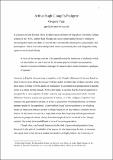Files in this item
Arthur Hugh Clough's pedigree
Item metadata
| dc.contributor.author | Tate, Gregory Paul | |
| dc.date.accessioned | 2021-06-27T23:34:55Z | |
| dc.date.available | 2021-06-27T23:34:55Z | |
| dc.date.issued | 2019-07 | |
| dc.identifier | 258743626 | |
| dc.identifier | 0b70c314-62e6-43ab-ace5-ebc3446c8295 | |
| dc.identifier | 000489746100008 | |
| dc.identifier | 85106772053 | |
| dc.identifier.citation | Tate , G P 2019 , ' Arthur Hugh Clough's pedigree ' , Journal of Victorian Culture , vol. 24 , no. 3 , pp. 323-328 . https://doi.org/10.1093/jvcult/vcz017 | en |
| dc.identifier.issn | 1355-5502 | |
| dc.identifier.other | ORCID: /0000-0002-5930-8187/work/60631332 | |
| dc.identifier.uri | https://hdl.handle.net/10023/23426 | |
| dc.description.abstract | The writings of Arthur Hugh Clough display a sustained interest in the relations between an individual, his or her generation, and the processes of historical change that distinguish and demarcate one generation from another. As someone who spent much of his life as a student and teacher, Clough was self-consciously aware of his location within an educational cohort, and of his relation to other cohorts and generations. Discussing Clough’s writings on literary history and two of his poems, Dipsychus and the Spirit and Amours de Voyage, this essay shows that he was sceptical of the notion that writers of the same generation shared a ‘mental affiliation’, or that a ‘pedigree of opinion’ linked one generation to another across time. Clough’s interpretations of history emphasise revolutionary rupture rather than organic progress, and he suggests that literary historians might do well to attend to the ‘strange contrast’ that exists between different writers of the same generation. Clough’s view of history contrasts strikingly with those of other writers born in 1819, and this essay argues that a study of the 1819 cohort can help to focus and clarify our understanding of Victorian historicism. This or any cohort can be studied as a cross-section of Victorian debate, highlighting through contrast the diversity of opinions held by people who happened to be born in the same year. The historicism of Clough and his contemporaries can help scholars and readers in the twenty-first century to historicize the Victorians more discriminatingly. | |
| dc.format.extent | 200985 | |
| dc.language.iso | eng | |
| dc.relation.ispartof | Journal of Victorian Culture | en |
| dc.subject | 1819 | en |
| dc.subject | Generation | en |
| dc.subject | Victorian | en |
| dc.subject | Poetry | en |
| dc.subject | PR English literature | en |
| dc.subject | T-NDAS | en |
| dc.subject.lcc | PR | en |
| dc.title | Arthur Hugh Clough's pedigree | en |
| dc.type | Journal article | en |
| dc.contributor.institution | University of St Andrews. School of English | en |
| dc.identifier.doi | https://doi.org/10.1093/jvcult/vcz017 | |
| dc.description.status | Peer reviewed | en |
| dc.date.embargoedUntil | 2021-06-28 |
This item appears in the following Collection(s)
Items in the St Andrews Research Repository are protected by copyright, with all rights reserved, unless otherwise indicated.

